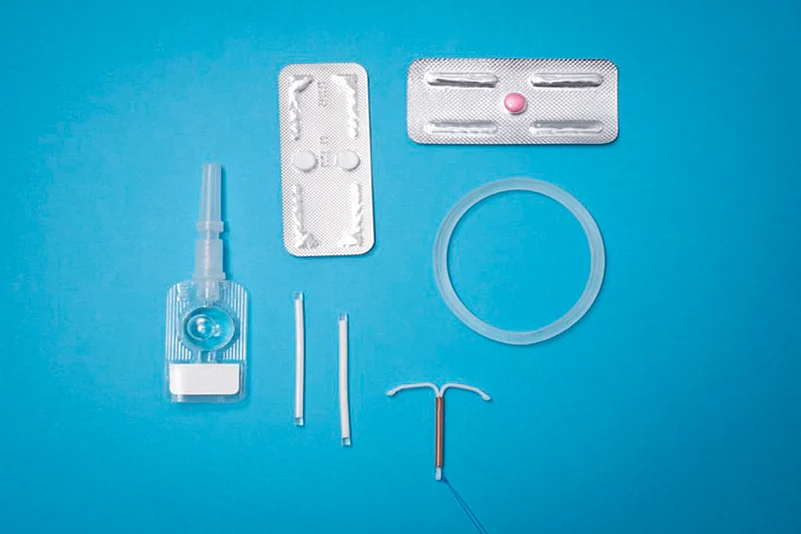The last 15 months have led to tremendous disruption in the lives of people worldwide. Covid-19 has had an unprecedented impact on healthcare delivery systems - not just on critical services, but also on routine services including contraception. An analysis conducted by UNFPA and Avenir Health for 115 low-and middle-income countries in January 2021 estimated that 12 million women may have been unable to access family planning services as a result of the Covid-19 pandemic. A survey conducted by WHO in 105 countries to assess the impact of Covid-19 on essential services, estimated that family planning services were disrupted in 68% of the countries. Closer home, the nationwide lockdown was enforced in mid-March 2020, and over these 15 months, the health system, in particular, has been severely impacted. Foundation for Reproductive Health Services (FRHS) India in their policy brief on impact of Covid-19 on India`s family planning program indicated there were at least 24 million couples who were not able to access contraception in 2020.
Expert opinions worldwide and various simulations undertaken to understand the nature of transmission of the virus and containment measures predict that the pandemic is expected to continue for an extended period and therefore will continue to pose challenges for the healthcare delivery system. It is now imperative for India to identify and implement alternative mechanisms, to make contraceptive services more accessible to prevent unintended pregnancies. The Centre in the past has taken various initiatives like home delivery of contraceptives by ASHAs to ensure easy access to contraceptive services. However, solutions designed for normal contexts often cannot withstand the spiralling pressures brought on it by a massive scale disaster, like this pandemic.
The Covid-19 experience strongly highlights that the pandemic and other humanitarian crises severely affect the socio-economic conditions of families, increase the unmet need for contraception, and compromises the sexual and reproductive rights of an individual – there is a need to plan and implement specific actions to ensure that this does not happen.
In a study conducted by Ipas Development Foundation to assess the impact of Covid-19 on the sexual and reproductive health (SRH) needs of young women and girls, sixty-two percent of the respondents acknowledged that they were scared to visit a health facility during these times. The study also examined retrospective insights from pregnant women and 27% of the currently pregnant women said theirs was an unwanted pregnancy; of these 39% wanted a contraceptive but could not get it due to Covid-induced restrictions. To ensure that such needs for contraception are met and unwanted pregnancies prevented, there is a need to deviate from the traditional modes of communication and services and consider alternate modes to reach the community.
In addition to social media, rural-facing community radio networks and grassroots NGOs, and self-help groups should be leveraged to create awareness among people on acceptance or continuation of contraceptive methods and where to source them. Virtual technologies like a chatbot, helpline, etc can be used to reach out to men and women not only to share information about contraceptives and location from where it can be obtained but also to assist in ensuring continuity of use.
It is essential to ensure that the contraceptive requirement of young people is met through youth-friendly and appropriate services and messages. The recent Pankh initiative of the Federation of Obstetric and Gynaecological Societies of India (FOGSI) to generate awareness about reproductive health issues among youth could be leveraged and promoted to ensure non-judgemental and accurate information and services.
Expanded service delivery options and the basket of choice become even more critical in times of any disaster. Telemedicine for initial method eligibility screening and for providing referral linkage for the adoption of method needs to be ramped up to provide alternate options to clients. Similarly enabling increased options for self-care through the introduction of subcutaneous injectable in the national family planning program will give women the much-needed autonomy to choose long-acting contraception.
The public health system faces the pressure of managing the aftermath of any disaster, leading to disruption in routine services, including family planning/contraception. Therefore public-private partnership strategies of accreditation, franchising, and strategic purchase should be leveraged to network local clinics and reduce the dependency on public health facilities for the provision of LARC and permanent methods of contraception.
Covid-19 has been an overwhelming experience but at the same time it provides us an opportunity to learn and build resilience in our health system and communities so that impact of any future disaster can be mitigated.
(Dr S Shantha Kumari is the President of the Federation of Obstetric and Gynecological Societies of India (FOGSI); Mr Vinoj Manning is the CEO of Ipas Development Foundation. Views expressed are personal and do not necessarily reflect those of Outlook Magazine.)
















